Iranian-born Israeli indicted on suspicion of spying for Iran
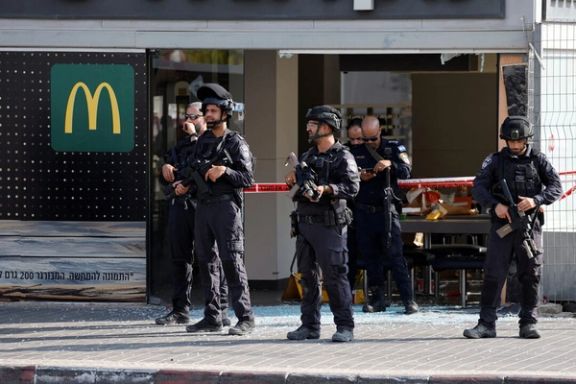
An Israeli citizen of Iranian origin has been charged with espionage, accused of passing sensitive details about Israeli war plans to an Iranian intelligence operative.

An Israeli citizen of Iranian origin has been charged with espionage, accused of passing sensitive details about Israeli war plans to an Iranian intelligence operative.
He is accused of revealing the identity of an Iranian sailor on an oil tanker who allegedly aided Israel, disclosing Israeli military strike plans and commando missions, providing drone flight paths from Azerbaijan into Iran, and confirming that Israel’s Nevatim Air Base was hit during Iran’s April missile barrage last year.
The unnamed suspect was arrested earlier in July, and the Attorney General's Office requested that his detention be extended until the end of the proceedings.
He moved to Israel in 1999 and according to court documents, rekindled ties to his birthplace over a decade later on a trip to Turkey, when he visited the Iranian embassy.
According to the prosecutors’ report, he later began a relationship with an Iranian woman who introduced him to Iranian operatives, whom he met in September during a visit to see her in Turkey.
As with previous cases brought before the courts in Israel, the accused maintained contact with the agents through Telegram.
In May, just one month before Israel’s surprise attacks on Iran, the defendant told his Iranian contact that Israel planned to carry out an attack in Iran. He later updated the agent that Israel was planning a commando operation targeting the Islamic Republic’s nuclear facilities.
The attorney's office said that "his dangerousness is heightened in light of the period in which he committed the offenses, during which war is being waged in the State of Israel on several fronts in general and with Iran in particular, and while missiles were being fired at Israel from Iran."
This month, two additional espionage cases were revealed. Indictments were filed against an Israeli soldier who passed information to the Iranians in exchange for money—including imagery of Iranian missile landings and impacts in Israel—and a teacher from the Bedouin community in the Negev who filmed fighter jet takeoffs.
More than 25 cases of Iranian recruitment attempts have been reported by Israeli security authorities over the last year, with over 35 indictments against Israeli citizens filed.
It has led Israeli authorities to launch a campaign earlier in july urging citizens to resist the lure of spying for Iran amid the surge in efforts by Tehran to recruit Israelis for espionage.
Iran’s judiciary chief said last week that around 2,000 people were arrested during and after the 12-day war with Israel, with some detainees accused of collaborating with the Jewish state potentially facing the death penalty.

Last month's US air strikes targeting Iran's nuclear infrastructure dampened foreign support for Tehran, US Secretary of State Marco Rubio said Saturday in an interview with Fox News.
"I think everyone, China, Russia, others, even North Korea, have become a little bit more cautious about supporting Iran, especially after our B-2s flew halfway around the world and conducted an operation and left before anyone found out about it," he said.
The strikes—dubbed Operation Midnight Hammer—saw B-2 stealth bombers target three key Iranian nuclear sites using 30,000-pound “bunker buster” munitions.
The June 22 attacks followed an Israeli missile barrage that had triggered a 12-day war with Iran. A ceasefire was reached on June 24.
Speaking with Lara Trump on Fox News’ My View, Rubio said the operation had a deterrent effect, especially during the height of the fighting. “They all kind of took a pass and said, we don't want to get involved in this thing,” he said of Iran’s traditional allies.
“President Trump reminded them” that the United States has “the most extraordinary military capabilities in the world.”
The June attack came after five inconclusive rounds of nuclear negotiations between Washington and Tehran.
Since the war, Iran has expelled the UN's nuclear inspectors and has threatened to pull out of the nuclear non-proliferation treaty as the situation continues to spiral.
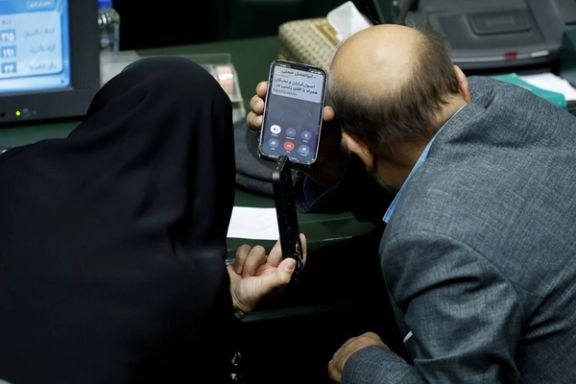
Iran has banned the use of mobile phones inside parliamentary chambers and committee meetings due to rising security concerns, state media reported on Sunday.
Parliament Speaker Mohammad Bagher Ghalibaf backed the decision, citing security issues as the main reason. “The matter of mobile phone use by lawmakers has been discussed by the parliamentary presidium. Regardless of security concerns, we are in the chamber to legislate, and mobile phone use is inappropriate,” Ghalibaf said during Sunday’s open session.
He added, “Even if the security issues are resolved, the presidium still opposes the use of mobile phones inside the chamber. Our dear people should know that when MPs are present in the chamber or in committees, they cannot use mobile phones.”
The restriction comes amid growing fears in Tehran over Israeli intelligence operations. In recent weeks, Iranian media and officials have warned of unprecedented Israeli surveillance capabilities.
A report by The Sunday Times saidon Saturday that Israeli intelligence had deeply infiltrated Iran’s military and nuclear infrastructure through complex operations over the past year.
Earlier this month, Abdollah Shahbazi, a former senior intelligence official and director of a state-affiliated research institute, warned on social media that Iranian officials should avoid carrying electronic devices for fear of being targeted. “It has now become clear that, in addition to drones and missiles, a highly active Mossad network is operating on the ground inside Iran,” Shahbazi wrote.
The ban has sparked criticism from some parliamentarians, who argue it hinders their ability to communicate with constituents.
Hamidreza Goudarzi, a lawmaker from Aligoudarz, said during Sunday’s session: “Not having our phones with us has become a problem. People expect us to be available and responsive, and this ban makes that difficult. I ask the presidium to step in and resolve this issue.”
Ghalibaf, however, said that the decision was made in consultation with security agencies. “Our colleagues in the security apparatus have specific views about mobile phone use after entering the chamber. We are following up with the presidium to make decisions accordingly,” he said.
The restriction appears to be part of broader efforts by Iranian authorities to tighten control over sensitive communications.
While the move has faced resistance from lawmakers concerned about accessibility, Ghalibaf said that constituents could still contact their MPs through office staff.“Citizens should understand that their representatives cannot speak on mobile phones while in the chamber, but their office teams can respond on their behalf,” he said.
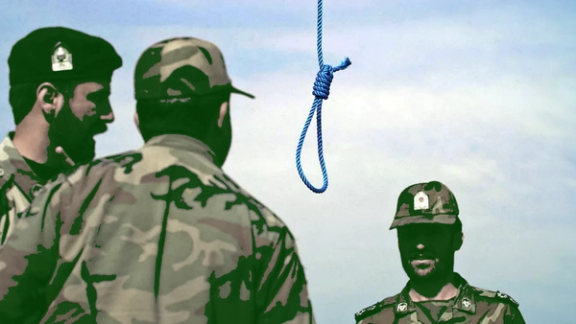
Iran has executed two men accused of belonging to the outlawed Mojahedin-e-Khalq (MEK) opposition group and targeting civilian sites with improvised weapons, the judiciary-affiliated news agency Mizan reported on Sunday.
The executions of Behrouz Ehsani-Eslamlou and Mehdi Hassani were carried out in Tehran’s Evin prison, where they had been held since their arrest. Both were convicted in September 2024 by Iman Afshari, head of Branch 26 of Tehran’s Revolutionary Court, on a range of national security charges.
According to the Mizan report, the charges included “baghi” (armed rebellion), “moharebeh” (waging war against God), “efsadfel-arz” (corruption on earth), membership in a terrorist organization, gathering classified information, and conspiracy against national security. Their sentences were later upheld by Iran's Supreme Court.
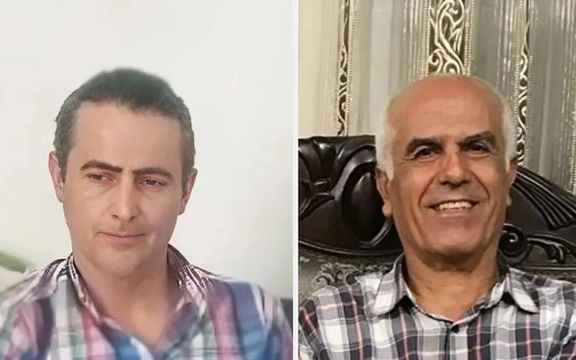
"The terrorists, in coordination with MEK leaders, had set up a team house in Tehran, where they built launchers and hand-held mortars in line with the group's goals," Mizan said. "They fired projectiles heedlessly at citizens, homes, service and administrative facilities, educational and charity centres, and also carried out propaganda and information-gathering activities in support of the MEK."
Semi-official Mehr News Agency reported that Ehsani-Eslamloo was arrested in 2022 following an explosion at the Ministry of Communication and Information Technology, an incident claimed by the MEK.
The MEK, or People's Mojahedin Organization of Iran, was a prominent Marxist-Islamist group that staged bombing campaigns against Shah Mohammad Reza Pahlavi andUS targets in the 1970s. It later fell out with other factions of the 1979 Islamic Revolution and has since opposed the Islamic Republic from exile. The group’s leadership is currently based in Paris.
The MEK was designated a terrorist organization by the United States and European Union until 2012, though it continues to be banned in Iran.
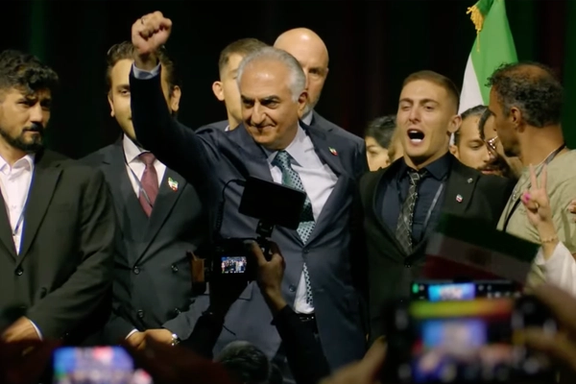
The Islamic Republic's downfall would lead to sustainable peace and prosperity in the Middle East, Iranian exiled prince Reza Pahlavi said on Saturday, calling for unity among dissidents during a major opposition gathering in Munich.
“This regime has poisoned our soil, air, and economy and dragged Iran to the edge of destruction. Ali Khamenei should know his regime is crumbling, many around him despise him, and thousands of his own forces are waiting to abandon the sinking ship,” Pahlavi said in his speech.
The Islamic Republic has lost its grip and is now weaker than ever, he said. “For the first time in decades, we have a real chance to uproot this anti-Iranian regime.”
The prince had earlier told Politico that over 50,000 state insiders including members of the military had registered with his platform to assist in the Islamic Republic’s downfall.
“Ending the Islamic Republic will bring lasting security and peace to the region,” he added, calling on all opposition groups to united around a transition plan.
“We, patriots who believe in freedom, are not like the criminals who order executions from rooftops,” he said, vowing that even Khamenei will enjoy a fair trial in the post-Islamic Republic Iran.
Exiled Queen and Nobel laureate rally support
In a video message, Iran's exiled Queen Farah Pahlavi backed the calls for unity, expressing admiration for Iranians’ resolve. “You have been suffering for more than four decades. It is your right to freedom, welfare, and sovereignty."
“I am behind you and the national revolution of Iran. I believe that with the will and solidarity of the people, greatness and glory will return to our historic land.”
Nobel Peace Prize laureate Shirin Ebadi also addressed the Munich event through a video message.
“The political structure and constitution (of the Islamic Republic) do not allow for any kind of reforms, and to achieve a democratic and secular government in which all citizens, regardless of political or religious beliefs or any other kind of differences, enjoy equal rights, there is no path but the overthrow of the regime and holding a referendum under the supervision of the United Nations," she said.
Ebadi said she is neither a monarchist nor a republican, but added that “hand in hand, we must strive to overthrow the regime and free ourselves from the demon of despotism."
"At the ballot box, each person will express their preferred form of government. Today is the time to choose.”
Protest victims' families
The gathering, which brought together over 500 figures from political, academic, and cultural spheres, also featured testimony from family members of protest victims.
“My Erfan is gone, but countless Erfans are rising from the soil,” said the mother of Erfan Dashti, a young man killed in the 2022 protests. Addressing Pahlavi directly, she added: “You are our only hope to reclaim our home.”
Mahboubeh Ramazani, whose son Pejman Qolipour was killed in the November 2019 crackdown, said: “This unity gives us joy because it means we will return. We want our Iran back from the enemies.”
The father of child protest victim Abolfazl Amirataei accused the Islamic Republic of squandering national wealth on regional adventurism, saying it “turned all reserves into dollars to fund chaos abroad.”
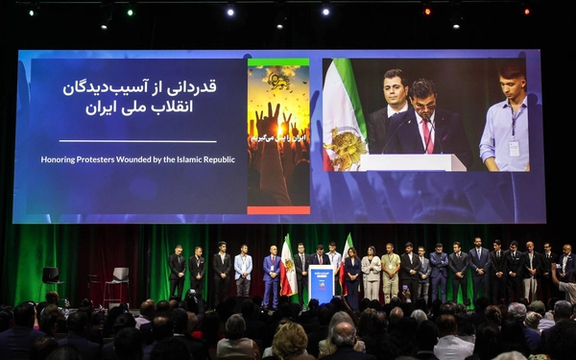
Danial Ilkhanipour, a member of the Hamburg State Parliament, said the window to act was narrowing. “There are only two options on the table. A democratic Iran or a more ruthless regime,” he said. He praised Pahlavi for understanding the urgency and called on opposition groups to move beyond ideology.
The event’s organizers said it was the most diverse opposition coalition ever convened outside Iran.
Pahlavi earlier called the event “perhaps the largest gathering ever” of anti-Islamic Republic voices since the 1979 revolution, aiming to project unity among opposition groups and reach audiences inside Iran.
He said all participants back three core principles: preserving Iran’s territorial integrity, defending individual freedoms and equality, and separating religion from the state.
“This opportunity will not last forever,” Pahlavi warned in his Saturday speech. “But with unity and resolve, we can seize it and reclaim Iran’s future.”
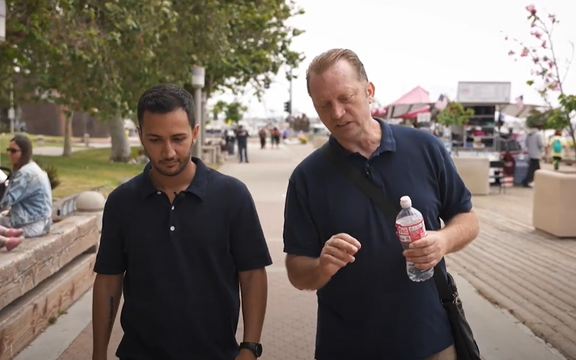
US Navy veteran Michael White's pursuit of love in Iran instead landed him in a Mashhad jail, where he looked destined to languish as a political bargaining chip.
But the kindness of an Iranian cellmate allowed him to contact his loved ones, and Mehdi Vatankhah's risking of his own life ultimately earned him a new one in the United States.
I traveled to San Diego to chronicle the unlikely bond forged between two unfairly imprisoned men born a world apart but now forever united by solidarity and friendship.
At the border crossing between the United States and Mexico, a man with a tired face but a warm smile greeted me. Michael White, a former hostage in Iran, broke the ice with Iranian-style jokes and a few Farsi words. One of the first things he said was, “The Iranian regime is not like its people. Iranians are amazing. I love their culture. They deserve a better life.”
That sentence marked the beginning of the documentary I wrote and produced—one that follows the intertwined lives of two men: Michael White, an American hostage freed from Iranian prisons, and Mehdi Vatankhah, a young Iranian political activist. It’s a journey from solitary confinement cells in Mashhad to the open skies above California.
Michael, a Los Angeles native and a US Navy veteran, traveled to Iran in 2018 to meet a woman named Samaneh Abbasi, whom he had met in online chat rooms. But what began as a romantic trip soon turned into a nightmare.
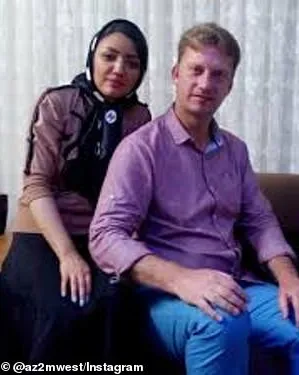
On his third trip, he was arrested in Mashhad and sentenced to 10 years in prison on charges of “insulting the Supreme Leader” and “publishing private photos.”
He was taken to a secret detention facility run by the Ministry of Intelligence, where he endured harsh interrogations and torture aimed at forcing him to confess to espionage for the US and Israel. The pressure was so intense that he once attempted suicide.
After weeks in solitary confinement, he was transferred to Vakilabad Prison in Mashhad, where he shared a cell with Mehdi Vatankhah. Within those cold, gray prison walls began a bond that would alter both of their destinies.
Michael recalls that before his arrest, he had fallen deeply for Samaneh. He had first met her in Kish Island and was captivated by the kindness of the Iranian people and their culture. After returning to the US, his feelings only deepened. Determined to meet her family in Mashhad, he even converted to Islam in San Diego to remove any religious barriers.
But by the time of his third visit, Samaneh had told him she no longer wanted a relationship. Still, he hoped to meet her over lunch and propose formally. Instead, on his way to the meeting, three black vehicles intercepted him. His eyes were blindfolded, his head pushed down, and he was taken to an unknown location.
He was held in a surveillance-monitored room and only allowed out for interrogations—interrogations marked by shouting, threats, physical abuse, and sleep deprivation. His captors wanted him to confess which intelligence agency he worked for. At one point, the case prosecutor told him: “Six Iranian operatives are imprisoned in the U.S. You're the only American we can use for an exchange.”
Eventually, he was transferred to Vakilabad Prison, where he shared a cell with Vatankhah. Mehdi, a political prisoner with strong English skills, gradually gained Michael’s trust.
“The first time I saw him,” Mehdi recalls, “I could tell from the way he walked that he was seriously ill. He was wary of everyone. Later I learned that even his mother didn’t know where he was.”

In 2020, Mehdi was temporarily released. Using the information Michael had given him, he contacted Michael’s family and the US State Department. Until that point, US officials didn’t even know Michael was being held in Iran. Thanks to those efforts, Michael was able to meet with representatives of the Swiss Embassy in Tehran, which protects the US interests in Iran.
During the COVID-19 pandemic, Michael became ill. Iranian authorities, fearing the political fallout of his potential death in custody, transferred him to a safe house in Tehran.
On June 4, 2020 (15 Khordad 1399), Michael was exchanged for Majid Taheri, an Iranian American physician who had been jailed in the US for violating sanctions. Notably, Taheri chose not to return to Iran after his release and remained in the United States.
Then-President Donald Trump tweeted, “I will never stop working to secure the release of Americans held hostage overseas.” He thanked both the Swiss government and Iran for facilitating the exchange, saying it proved “a deal is possible.”
But Iran’s history of hostage-taking goes far beyond Michael’s case. From Nizar Zakka and Jason Rezaian to Siamak Namazi—and today, the French couple Cécile Kohler and Jacques Paris, now in their third year of detention—the pattern remains: arrests used as political leverage. In reality, Iran has proven that negotiating with it is far from easy.
Michael’s mother released a statement after his freedom: “During the 683 days my son was held hostage by Iran’s security forces, I lived in a nightmare.”
Yet the story didn’t end there. In prison, Michael had promised Mehdi that if he were ever freed, he would help him achieve his dream of becoming a pilot. With Michael’s legal support, Mehdi was granted entry into the United States through a humanitarian parole program. Today, he lives and flies in San Diego.
On one of his first flights, I sat beside him in the tiny cockpit of his light aircraft. When I asked how he felt looking back, he simply said, “It all feels like a nightmare… a nightmare I’ll never forget.”
But the scars Michael carried from Iran went beyond prison and torture: “Betrayal, heartbreak, unanswered questions. “He still drifts into silence whenever he hears Samaneh’s name, staring off and murmuring, “I don’t know why it happened. I was just in love with her.”
When I asked if he believed Samaneh was an agent, he didn’t answer directly. He only said, “Samaneh was like many Iranians. Outside, she wore a hijab, but inside her home, she and her family were just like Americans—like so many Iranians.”
Michael still insists: “The Iranian people don’t deserve this regime. They’re good people who deserve freedom and a better life.”
Perhaps Michael’s story has ended. But what the Islamic Republic has been targeting for years goes far beyond one man or one nation. It is humanity itself: human connection, freedom of speech, the right to live. And not just for Iranians—for anyone who dares to step onto its soil.